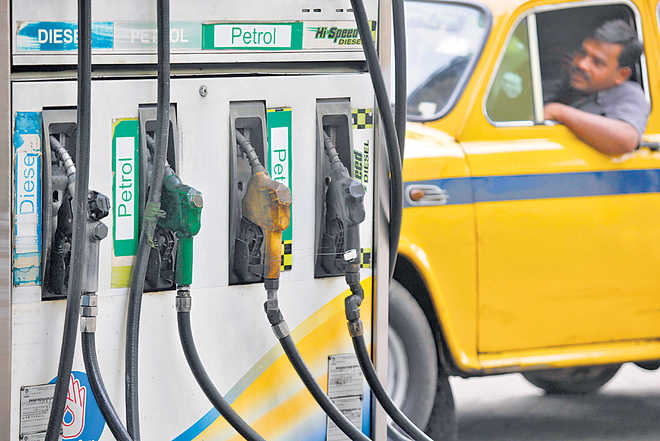
RISING OIL PRICES: Petrol and diesel prices are at a three-year high. Reuters
Rajeev Jayaswal
Petrol and diesel prices are at a three-year high and continue to inch up in small doses every day. This is despite a 44.74% drop in the average price of crude oil purchased by state-run refiners three years ago. If the entire benefit would have been passed to the consumer, pumps in Delhi could be selling petrol and diesel at around Rs 40 per litre and Rs 32.50 a litre, respectively. Then, why are we paying Rs 70.51 per litre for petrol and Rs 58.88 a litre for diesel? One way to find the answer is to identify the beneficiaries of this windfall.
Prima facie, the Centre, states and oil marketing companies appear to be the three obvious beneficiaries. The central and state governments have raised taxes and levies on petrol and diesel to fill their coffers. As per price buildup data published by the state-run Indian Oil Corporation (IOC) on September 17, taxes constituted 51% of the retail price of petrol and 44% of the diesel price in New Delhi. Of course, auto fuels are often the easiest and laziest way to collect taxes.
Unfair way of doing welfare
The revenue-hungry government is unmindful of the fact that indirect taxes on auto fuels would hit even the common man. Any increase in the diesel price would push up prices of food, vegetables and essential commodities. Some justify high taxes on fuel because the government needs money to fund developmental works. Those who are really concerned about the poor would, however, disagree with Petroleum Minister Dharmendra Pradhan's recent tweet: "Prevailing tax rates on diesel/petrol must be correlated with our spendings on Govt Welfare Schemes, Infra, Water & Sanitation…". This is an unfair way of doing welfare as the government indirectly collects money from even the poor to build infrastructure that would also be used by the affluent section of society.
Daily pricing mechanism opaque
After the Centre and states, the third major beneficiary of this daily pricing regime is fuel retailers dominated by state-run IOC, Bharat Petroleum Corporation Ltd (BPCL) and Hindustan Petroleum Corporation Ltd (HPCL). They have devised some mechanism to link domestic petrol and diesel rates on a par with international markets. They also publish the daily price buildup. Petroleum Minister Pradhan recently tweeted that the "petroleum pricing mechanism in India is the most transparent in the world". But, two possible ambiguities are still suspected in this transparent mechanism, which must be examined by an independent regulator.
The first ambiguity in the daily pricing mechanism is related to the very basis of the formula. Oil companies say that they link domestic prices of petrol and diesel with some unspecified international benchmarks. What are these international benchmarks? Are they the most appropriate benchmarks for the Indian situation? Companies must also name them so that the consumer can independently verify the daily changes in the international rates. It is surprising that their names are not yet made public.
Another ambiguity in the price buildup formula is the element related to "marketing cost, margin, freight and other charges". This element was completely missing until September 14, 2017. A day before the introduction of this new element, the old formula could not explain a gap of Rs 4.05 per litre before petrol was transported from refinery to the dealer. In the case of diesel, it stood at Rs 4.56 per litre. Suddenly after September 14, this element was defined under the head of "marketing cost, margin, freight and other charges" and the quantum was reduced sharply to Rs 2.75 per litre for petrol and Rs 2.53 per litre for diesel. An independent regulator must examine this discrepancy along with the legitimacy of these charges.
Empower the regulator
An independent validation is not very difficult. The country has an independent petroleum regulator, albeit dormant. The UPA government had created an independent regulator by enacting The Petroleum and Natural Gas Regulatory Board (PNGRB) Act, 2006. As per the Act, the regulatory body is created "to protect the interests of consumers and entities engaged in specified activities relating to petroleum, petroleum products and natural gas and to promote competitive markets…."
So, what is the regulator doing to protect the consumer interest? As on date, nothing. The reason is simple. The Petroleum Ministry never wanted to dilute its power by empowering the regulator. Therefore, it has existed like a toothless tiger since October 1, 2007. Despite having a mandate from Parliament, the PNGRB can't check and control petrol and diesel prices fixed by private and public sector oil companies because the oil ministry has withheld the crucial "Section 16" of the Act.
Section 16 empowers the regulator to check and regulate prices of petroleum products, including petrol and diesel. For some reasons, the then Petroleum Minister Murli Deora did not notify this particular provision while executing the mandate of Parliament. Successive ministers Jaipal Reddy, Veerappa Moily and Dharmendra Pradhan chose to remain silent.
The PNGRB or petroleum regulator was created to replicate powerful telecom regulator, the Telecom Regulatory Authority of India (TRAI), which took decisive steps to reduce mobile bills of consumers. But, the petroleum regulator was never given this chance by both the UPA and NDA regimes.
At present, the condition of the petroleum regulator is worse as it has only one member and no chairman. The government must reconstitute the body by appointing other members and a chairman and also notify Section 16. Let the independent regulator examine and regulate prices of the two most significant commodities because any spike in their rates is inflationary, directly affecting millions of poor. Private or public, the oil companies cannot be given a free hand in determining the prices of petrol and diesel. It is surprising that instead of protecting the interests of consumers, ministers such as KJ Alphons are defending an opaque pricing mechanism.



























